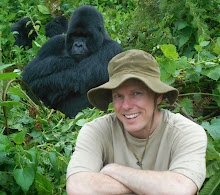
Offshore for multiple days, insomnia is no longer an issue. I sleep deep and dream wild, awake unsure of truth or fiction. Is that an actual development, a new predicament? A real woman I met on vacation? By the time the coffee pot is full and fresh, consciousness returns and illusions fade. I assume the watch at 0600, we're standing by on location, a dense field 20 miles due south of Grand Isle, La., where tar balls made their first landfall during this summer's BP oil spew.
Production platforms may stand alone but usually appear in packs all along the Gulf coast, mostly inside the 10-fathom curve and atop the continental shelf. A 3-mile radar scan can produce hundreds of dots, mostly random and haphazard, sometimes in geometrically recognizable patterns. The most populous fields, the ones closest to Belle Pass and Port Fourchon, have names, Bay Marchan, the Rabbit Field--I can't be sure from where that name hails. I've been told the perplexing mass used to look like a rabbit on the radar screen, although today so many platforms and satellites exist in the few square miles that identifying a rabbit is like picking an item from an ink blot, a face from a cloud. Perhaps it's origin is a simile, platforms reproducing in hordes, replicating like rabbits.
A gap between the two massive fields, a thoroughfare for boat traffic, is known colloquially as "the hole in the wall". In the daytime it's an innocuous setting for navigation. At night or in restricted visibility, it's a danger zone, nearly impossible to distinguish the fixed from the moving, another vessel underway. We have an AIS to alert us to the position of other boats, but only if they have an AIS, too, and unfortunately, it's not required. Some advanced radars are capable of distinguishing fixed targets from moving, but only after a 6-minute interval of data has been collected and only provided your vessel doesn't change course--in other words, still useless.
We're offshore to transport a construction crew of a dozen men as they work their way through the field repairing aging structures, sandblasting and painting and welding new handrails. I see land only once in 10 days. The Apache Energy Corp. has been fined $10,000 by MMS for the condition of a platform, but that's less than the daily budget for this construction crew, which I'm told is 12 grand. We mostly stand-by watching thunderstorms and water spouts, rainbows and lightning. The platforms are mostly un-manned and the crew uses rope swings to get from the boat to the landings, a bit unnerving in choppy seas.
We arrive at GI 47H just in time for a passing storm, water pellets emerging from gray. The crew wants to wait it out. They come to the bridge to check the radar, observe the weather, a vacant horizon. We listen to local news, the anniversary of Katrina, reflections and recollections. Rain stills the sea and removes white caps, a sea turtle drifts by, the first I've seen in some time, droplets like pin pricks onto the skin of the sea. It doesn't take long before the guys pipe in with reminiscence and story-telling ensues. The company man says they lost 16 platforms during Katrina, just in the Grand Isle area. His first post-hurricane excursion via helicopter led to a set of coordinates and to an empty patch of sea. Another worker shares a tale of inspecting a platform when a tremendous impact shook the structure. "We was lookin' over the side for the boat that hit us, but there wudn't one." He says a dive team told them later that another platform had rolled into the base of the one they were on.
It's like any unforgettable development, a spell of heightened awareness, a blend of anxiety and adrenalin. Given the right circumstances, recollections becomes nostalgic. Time at sea is good for that and other things, introspection and inspiration. Bayou lore says that Kris Kristoferson wrote "Me & Bobby McGee" on his way home from a stint offshore. Mr. Kristoferson was a helicopter pilot in the Gulf, flew for Kerr-McGee to service the oil field. Maybe it was the view from above, the expanse of sea below, the open road and satisfaction of a paycheck with the coming of vacation--instant freedom, reduced stress. Freedom's just another word for nothing left to do, he wrote. At least it is for those who grasp it, for those who find clarity in motion, the pilot or mariner, the cowboy or indian on a horse, at harmony with the spinning axis, spatial limitations overcome by psychology, sense of wonder, the realization of freedom.






















